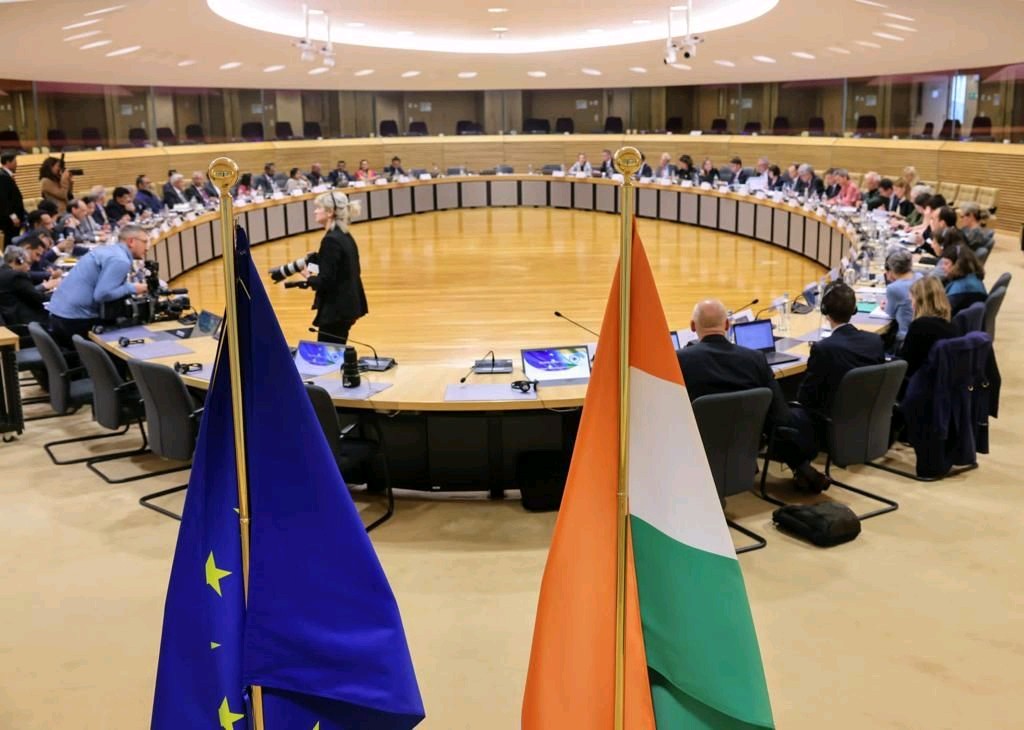On the 16th of May, the Trade and Technology Council (TTC) held its inaugural ministerial meeting between the European Union and India in Brussels. This first Ministerial Meeting follows of the launch of the Trade and Technology Council to lead on digital transformation, green technologies and trade on 6 February 2023 and the announcement by President of the European Commission, Ursula von der Leyen, and Prime Minister of India, Narendra Modi, on 25 April 2022 in New Delhi.
The TTC serves as a crucial platform to strengthen the strategic partnership on trade and technology between the two partners. The EU and India share a common interest in ensuring security, prosperity, and sustainable development based on shared values, particularly in the face of geostrategic challenges. The TTC aims to increase bilateral trade between the EU and India, which reached a historic high of €120 billion worth of goods traded in 2022, including €17 billion of digital products and services.
The ministerial meeting was co-chaired by Executive Vice-Presidents Margrethe Vestager and Valdis Dombrovskis on the EU side, and on the Indian side by Subrahmanyam Jaishankar, Minister of External Affairs; Piyush Goyal, Minister of Commerce and Industry; and Rajeev Chandrasekhar, Minister of State for Skill Development and Entrepreneurship and Electronics and Information Technology. High Representative/Vice-President Josep Borrell and Commissioner for Internal Market, Thierry Breton, also participated.
Trade and Technology Council
EU’s partnership with India is considered as one of the most important relationships for the upcoming decade and strengthening this partnership, including through the TTC, is seen as a priority.
The EU has strong trading relationship with India, EU being India’s 2nd largest trading partner, accounting for €120 billion worth of trade in goods in 2022 or 10.8% of total Indian trade. On the other hand, India is the EU’s 10th largest trading partner, accounting for 2% of EU total trade in goods. Trade in services between the EU and India reached €40 billion in 2021.
Trade and Technology Council
The EU and India established the TTC as a coordination platform to address key trade, trusted technology, and security challenges. The ministerial meeting relied on the work of three working groups.
1. Strategic technologies, digital governance, and digital connectivity
The EU and India will collaborate on quantum and High-Performance Computing research and development projects to address challenges such as climate change, natural disasters, and personalized medicine. Both partners will also seek cooperation on trustworthy Artificial Intelligence and coordinate their policies regarding the strategic semiconductors sector through a dedicated Memorandum of Understanding. The EU and India will work towards bridging the digital skills gap and promoting exchange on digital talent. Both partners will engage on 5G, telecoms, and Internet of Things standardization. They will enhance the interoperability of their respective digital public infrastructures and promote secure, privacy-preserving solutions to benefit developing countries.
2. Green and clean energy technologies
Cooperation on research and innovation is seen as an important vehicle to unlock potential and bring new and sustainable technologies to the market. The EU aims to be climate neutral by 2050, and India by 2070. To achieve these objectives, both partners will drive innovation and increase research efforts for safe and sustainable development. The EU and India will focus on waste water management, including plastic litter and waste to hydrogen; recycling of batteries for e-vehicles and standards through pre-normative research. Cooperation on these topics should also strengthen the role of start-ups and building skills and capacity.
3. Trade, investment, and resilient value chains
The EU and India have agreed to deepen their common work on resilient value chains, work to resolve bilateral market access issues, and exchange information on each other’s mechanisms on foreign direct investment screening. They will also address global and multilateral trade issues, with particular emphasis on the World Trade Organization. The two sides have also agreed to intensify their engagement on carbon border measures.
The TTC will continue to work in parallel with ongoing negotiations for comprehensive and ambitious agreements on trade, investment protection, and geographical indications, which aim to maximize the considerable, yet largely untapped, trade and investment potential between the EU and India.
Ministerial meetings of the TTC will take place at least once a year, alternating between the EU and India. Working groups will meet regularly to deliver on the above political priorities. The next ministerial meeting is scheduled for early 2024 in India.
Do you have a question about this article or about doing business in India, please get in touch with us here or email to monika@nyasa.solutions.

